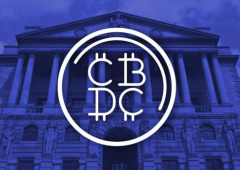Ledger Unveils New Hardware Wallet at Nashville Bitcoin Conference
28.07.2024 13:00 1 min. read Alexander Stefanov
At the Bitcoin 2024 convention in Nashville, Ledger launched its newest hardware wallet, Ledger Flex.
This device features a secure E Ink touchscreen, NFC connectivity, and runs on Ledger’s Secure OS, aiming to improve user experience without sacrificing security.
The Ledger Flex showcases a sleek black and steel design, with a special BTC Edition also available. It boasts a 2.8-inch high-resolution E Ink display for clear transaction visibility and extended battery life, lasting weeks or months on a single charge.
This release follows the earlier launch of Ledger Stax, known for its curved E Ink display. According to Pascal Gauthier, Chairman & CEO of Ledger, the introduction of both products this year aims to revolutionize self-custody. Ledger currently secures over 20% of global digital assets, and these new devices are intended to make self-custody more user-friendly for individuals and businesses.
Priced at $249, Ledger Flex is positioned between the Nano series and the $399 Ledger Stax. It integrates with the Ledger Live app, supporting 70 blockchains and 200 dApps.
Ledger also introduced the Ledger Security Key app, compatible with both Ledger Stax and Ledger Flex, for secure logins using Two-Factor Authentication (2FA) and Passkey features. Chief Experience Officer Ian Rogers emphasized that secure touchscreens are crucial for true security.
-
1
Elon Musk’s X Prepares to Enter the Fintech Arena
20.06.2025 13:00 1 min. read -
2
Bitget Wallet Teams Up with Mastercard to Launch Crypto-Powered Payment Card
01.07.2025 16:00 2 min. read -
3
China Pushes Digital Yuan Expansion as Global Currency Power Shifts
19.06.2025 17:00 1 min. read -
4
Fiserv to Launch FIUSD Stablecoin Across Its Massive Banking Network
23.06.2025 21:00 1 min. read -
5
Mastercard Integrates Chainlink to Power Direct Crypto Access for Cardholders
25.06.2025 18:00 1 min. read
Bitget Wallet Teams Up with Mastercard to Launch Crypto-Powered Payment Card
Bitget Wallet has entered a strategic partnership with Mastercard and Web3 payment provider Immersve to launch a new payment card that allows users to spend cryptocurrencies directly from their digital wallets.
Robinhood to Launch Tokenized Shares of OpenAI and SpaceX for European Users
Robinhood CEO Vlad Tenev revealed plans on Monday to bring tokenized equity offerings to the European market, starting with shares in private tech giants OpenAI and SpaceX.
Coinbase to Launch U.S. Perpetual-Style Futures on July 21
Leading crypto exchange Coinbase (COIN) is set to launch perpetual-style futures contracts in the United States starting July 21, becoming one of the first regulated entities to offer a product that closely mirrors globally popular offshore perpetuals.
Robinhood Expands Crypto Futures With XRP and Solana Micro Contracts
Zero-commission brokerage Robinhood has expanded its cryptocurrency futures offerings by launching micro futures contracts for XRP, Solana (SOL), and Bitcoin (BTC).
-
1
Elon Musk’s X Prepares to Enter the Fintech Arena
20.06.2025 13:00 1 min. read -
2
Bitget Wallet Teams Up with Mastercard to Launch Crypto-Powered Payment Card
01.07.2025 16:00 2 min. read -
3
China Pushes Digital Yuan Expansion as Global Currency Power Shifts
19.06.2025 17:00 1 min. read -
4
Fiserv to Launch FIUSD Stablecoin Across Its Massive Banking Network
23.06.2025 21:00 1 min. read -
5
Mastercard Integrates Chainlink to Power Direct Crypto Access for Cardholders
25.06.2025 18:00 1 min. read


